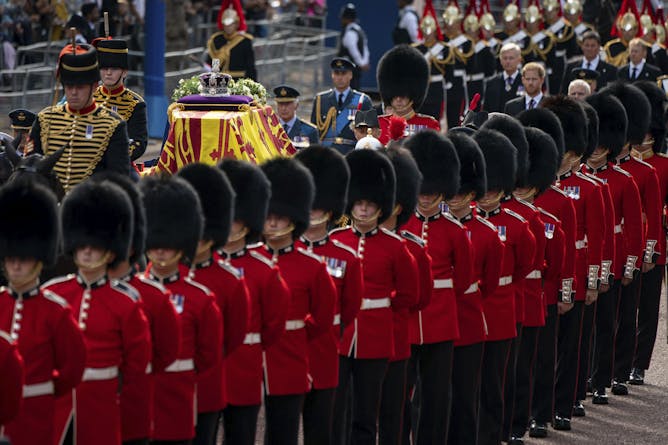|
Prime Minister Justin Trudeau has announced that Sept. 19, the date of Queen Elizabeth’s funeral, will be marked with a national holiday. Some provinces, including Nova Scotia, New Brunswick, P.E.I. and Newfoundland and Labrador, have declared it a provincial holiday, while Ontario, Saskatchewan and Manitoba have not. British Columbia has declared the day a holiday for public-sector workers.
In the context of the recent mass murder of 11 people on and near James Smith Cree Nation in Saskatchewan, and the thousands of Canadians who have died in the ongoing opioid crisis, this news has been met with mixed emotions and reactions.
Today in The Conversation Canada, Clint Burnham from Simon Fraser University questions why certain lives (and deaths) are considered more grievable by the Canadian authorities than others. He argues that decisions about who we mourn nationally can reveal deeper truths about our Canadian society and the lasting legacy of imperialism.
Burnham writes: “The national holiday makes clear that we believe the Queen’s life and death matters more than Indigenous lives and deaths. Indeed, her life and death matter more than many others.”
All the best.
Also today:
|

The coffin of Queen Elizabeth, draped in the Royal Standard with the Imperial State Crown placed on top, is carried on a horse-drawn gun carriage of the King’s Troop Royal Horse Artillery, during a procession from Buckingham Palace to Westminster Hall on Sept. 14, 2022.
(Aaron Chown/Pool via AP)
Clint Burnham, Simon Fraser University
Whose lives are considered worth grieving? Why is Queen Elizabeth’s life and death considered more grievable by authorities than Indigenous people, overdose victims or anyone else?
|

A building under construction in Toronto. According to Canada’s national housing agency, Ontario needs to build 1.8 million new homes to alleviate the housing crisis.
(Shutterstock)
Frank Clayton, Toronto Metropolitan University
Ontario’s first Growth Plan won awards that recognized the province as a leader in the field. But since then, successive changes to the policy have sabotaged the original plan’s progress.
|

Open access journals make peer-reviewed research available to anyone interested.
(Shutterstock)
Jessica Lange, McGill University
Some open access journals — those that don’t charge their readers a fee — require that researchers pay to publish with them. Removing author fees helps more researchers to publish their work.
|

Un soldat ukrainien joue avec un chien dans le territoire libéré de la région de Kharkiv en Ukraine, le 12 septembre 2022. Les troupes ukrainiennes ont repris une grande bande de territoire à la Russie.
(AP Photo/Kostiantyn Liberov)
Alexander Hill, University of Calgary
Les forces russes ont clairement battu en retraite en Ukraine, et il semble que Vladimir Poutine puisse perdre le contrôle de la guerre. Quelle est la prochaine étape ?
|

La nostalgie n'est pas une preuve de la façon dont les choses étaient autrefois.
(Shutterstock)
Lisa Farley, York University, Canada; Debbie Sonu, Hunter College; Julie C. Garlen, Carleton University; Sandra Chang-Kredl, Concordia University
L’enfance n’était pas plus « innocente » ou « naturelle » avant les technologies numériques ou la pandémie.
|
Ukraine Invasion
|
-
Nick Megoran, Newcastle University
Nato began its life as a purely defensive alliance against the Soviet Union. But has that role changed over the years?
|
|
Business + Economy
|
-
Kathleen Frydl, Johns Hopkins University
The United States came in 41st worldwide on the UN’s 2022 sustainable development index, down nine spots from last year. A political historian explains the country’s dismal scores.
|
|
Politics
|
-
Maria O'Sullivan, Monash University
It’s understandable some people wish to publicly grieve the Queen and offer their respects to her and the monarchy. But those who disagree with the monarchy also have a right to freedom of speech.
|
|
Science + Tech
|
-
Ivan Erill, University of Maryland, Baltimore County
Phages, or viruses that infect bacteria, can lie dormant within chromosomes until they’re triggered to replicate and burst out of their hosts.
|
|